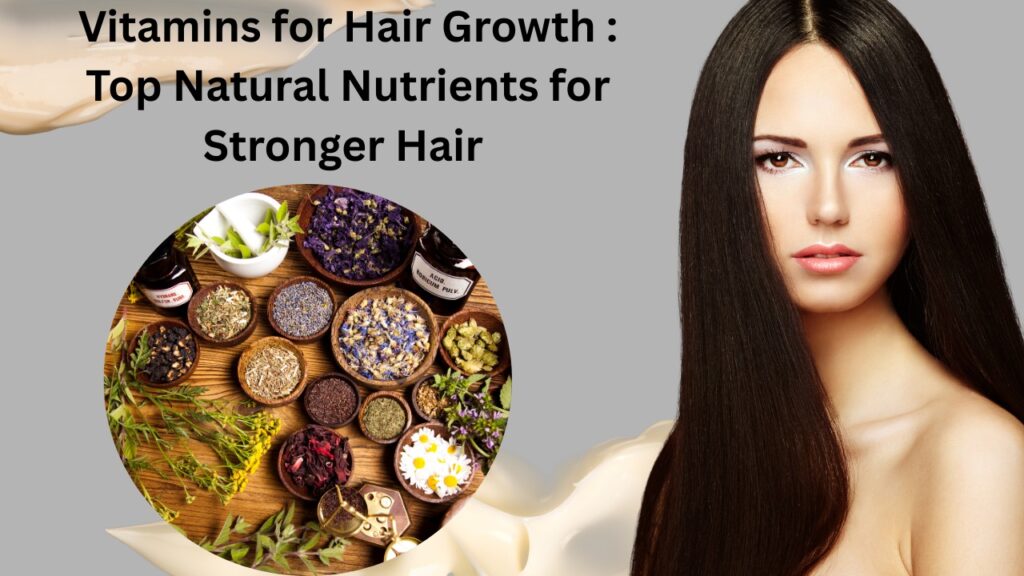Many people wish for long, thick hair at some point in their lives. Whether it’s to fix a bad haircut, deal with thinning hair, or simply to enjoy waist-length hair, the desire for faster hair growth is very common.
Although your genes play a big part in how fast and how long your hair grows, there are other things you can do to help. Good hair care and a healthy lifestyle can make a big difference in how your hair grows and how strong it becomes. Eating well, getting enough rest, and managing stress are all important for healthy hair growth.
Taking care of your scalp, using the right hair products, and avoiding too much heat or chemical treatments can also help your hair grow faster and healthier. When combined with patience and consistency, these steps can improve both the speed and quality of your hair growth journey.
Healthy, vibrant hair starts from within. While topical treatments and salon shampoos are widely advertised, real hair growth begins at the cellular level—and that’s where essential vitamins come into play. Let’s delve into the world of natural vitamins, minerals, and nutrients scientifically shown to strengthen hair, reduce shedding, and promote new growth. Prepare for a hair-care journey that’s as nourishing as it is empowering!
🌿 Why Hair Needs Vitamins & Nutrients
Hair follicles are some of the most metabolically active tissues in the body. They rely on:
Protein synthesis – Hair is made from keratin, a protein built from amino acids.
Energy metabolism – For growth and repair, follicles need energy and cofactors.
Antioxidant protection – To neutralize oxidative stress that ages follicles.
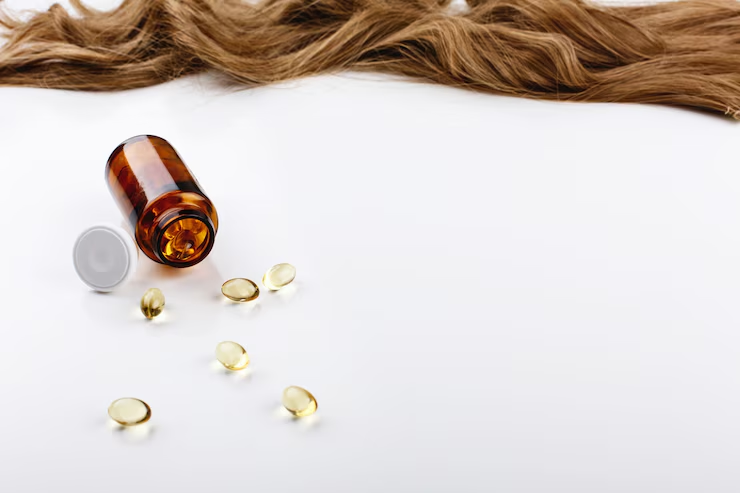
Without the right nutrients, hair can thin, break, become lifeless, or stop growing altogether. Deficiencies don’t always show as obvious disease—they may manifest subtly as loss of shine, slow growth, or brittleness. That’s why a well-rounded nutrient supply is vital.
✨ The Top Natural Vitamins for Hair Growth
Here are the most powerful vitamins (plus some minerals and nutrients) that have earned recognition for boosting hair health:
Vitamin A (Retinol & Beta‑Carotene)
Vitamin A plays an important role in hair health by helping the scalp produce sebum, a natural oil that keeps hair moisturized and strong. Without enough sebum, hair can become dry and brittle, which may lead to breakage. This makes Vitamin A one of the essential vitamins for hair growth and overall hair care.
There are two types of Vitamin A—retinol and beta-carotene. Retinol comes from animal sources like eggs and dairy, while beta-carotene is found in colorful fruits and vegetables like carrots and sweet potatoes. Both types support cell growth, including the cells in hair follicles.
However, balance is key. While Vitamin A is vital, too much of it can lead to hair loss. It’s important to get the right amount through a healthy diet rather than high-dose supplements. When consumed wisely, Vitamin A becomes one of the most helpful vitamins for hair growth.
What it does: Essential for cell division and skin/hair follicle integrity. Boosts sebum production to moisturize scalp.
Food sources: Sweet potatoes, carrots, pumpkins, kale, spinach, liver.
Daily needs: ~700–900 µg RAE (retinol activity equivalents) for adults.
Precautions: Too much vitamin A from animal sources or supplements can cause hair shedding. Stick with food sources rich in beta‑carotene, the plant-based precursor, which converts safely into active vitamin A as needed.
Tip: A colorful salad with roasted sweet potato, carrot slaw, and spinach nourishes hair from within.
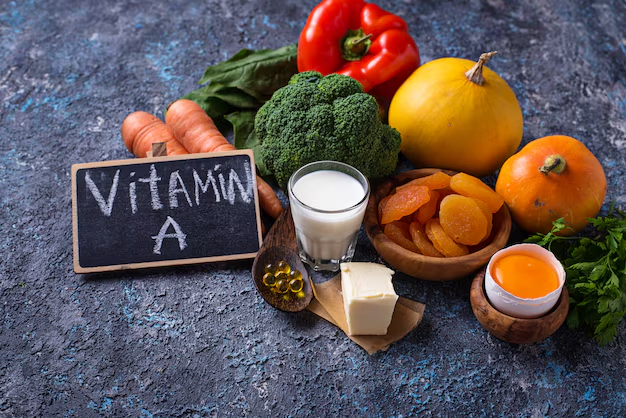
B Vitamins: Biotin (B7), Pantothenic Acid (B5), and Beyond
B vitamins are among the most important nutrients when it comes to healthy hair. Biotin (B7) and pantothenic acid (B5) are especially known for supporting stronger, thicker strands. These vitamins help the body convert food into energy, which is essential for hair cell growth and repair.
Biotin plays a key role in strengthening the hair shaft and preventing hair thinning. Pantothenic acid helps moisturize the scalp and can reduce hair breakage. Together, they are powerful vitamins for hair growth and maintaining overall hair health. Other B vitamins like B12 and B6 also support red blood cell production, which delivers oxygen and nutrients to the scalp.
A deficiency in B vitamins can lead to weak, brittle, or thinning hair. Including whole grains, eggs, leafy greens, and lean meats in your diet can help maintain healthy levels and support the benefits of these essential vitamins for hair growth.
Biotin (B7): Often dubbed the “hair vitamin.” Helps convert nutrients to energy and synthesizes keratin. Deficiency is rare, but supplementation (2,500–10,000 µg) may help brittle or thinning hair.
Pantothenic Acid (B5): Aids keratin production, may reduce hair greying, and supports scalp health.
Other B vitamins (B1, B2, B3, B6, B9): Work together for energy metabolism and hormone balance—key for hair growth.
Sources: Whole grains, nuts, seeds, eggs, legumes, leafy greens, and nutritional yeast.
Note: By regularly eating B-rich foods, you get a full synergistic mix—they’re water-soluble, so excess is excreted and toxicity is unlikely.
Vitamin C (Ascorbic Acid)
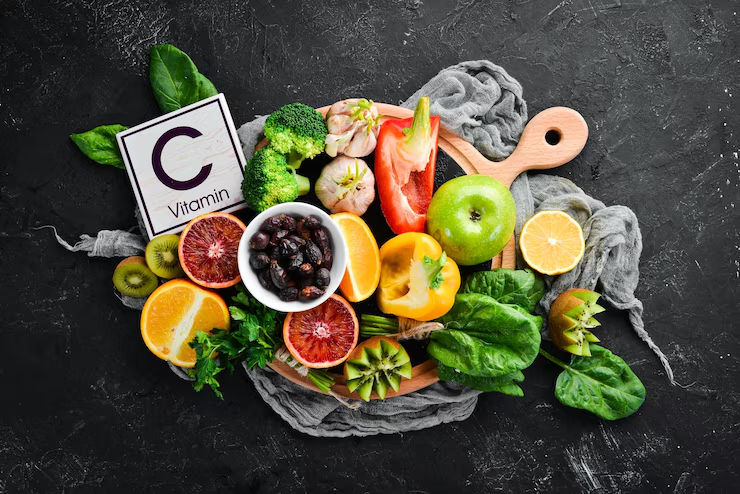
Vitamin C is a powerful antioxidant that helps protect hair from damage caused by free radicals. These harmful molecules can weaken hair, leading to breakage and slower growth. As a result, Vitamin C is considered one of the key vitamins for hair growth and strength.
This vitamin also plays a major role in producing collagen, a protein that supports hair structure. Strong collagen levels help keep hair strands firm and healthy. Additionally, Vitamin C improves iron absorption in the body, which is important because iron supports healthy blood flow to hair follicles.
A lack of Vitamin C can lead to weak, dull hair and slow growth. Including citrus fruits, strawberries, bell peppers, and other Vitamin C-rich foods in your diet can boost hair health. With its multiple benefits, Vitamin C clearly stands out as one of the essential vitamins for hair growth.
Function: Powerful antioxidant that neutralizes free radicals damaging hair follicles. Critical for collagen production—collagen strengthens blood vessels nourishing hair.
Support for iron absorption: Enhances uptake of plant-based iron (non-heme).
Sources: Citrus fruits, bell peppers, strawberries, kiwi, broccoli, guava.
Daily dose: 75 mg (females), 90 mg (males). Many experts suggest 200–500 mg from whole foods.
Creative boost: Start the day with a smoothie of spinach, strawberries, and lime for a vitamin C + iron combo your follicles will love.
Vitamin D
Vitamin D plays a key role in creating new hair follicles, which are the small openings where hair grows. When your body has enough Vitamin D, it may help boost the number of active hair follicles, supporting thicker and fuller hair. This makes it one of the essential vitamins for hair growth.
A lack of Vitamin D has been linked to hair thinning and certain types of hair loss, such as alopecia. Since Vitamin D supports the immune system and helps reduce inflammation, it can also create a healthy environment for hair growth on the scalp.
Sunlight is the best natural source of Vitamin D. You can also get it from foods like fatty fish, eggs, and fortified milk. For those who don’t get enough sun exposure, supplements can help. Including enough Vitamin D in your daily routine supports scalp health and acts as one of the key vitamins for hair growth.
Role: Influences hair follicle cycling; deficiency linked to hair thinning and alopecia areata.
Natural synthesis: Sunlight triggers vitamin D production in skin.
Food sources: Fatty fish (salmon, mackerel), egg yolks, fortified dairy or dairy alternatives, mushrooms grown under UV light.
Levels to aim for: Blood levels 30–50 ng/mL (75–125 nmol/L).
Indian context: Many people in South Asia, including India, experience vitamin D deficiency due to limited sun exposure from clothing or indoor lifestyles—so dietary intake or supplementation is essential.
Tip: After sun-smart outdoor time, include vitamin D–rich tofu scramble or grilled fish for dual health benefits.
Vitamin E
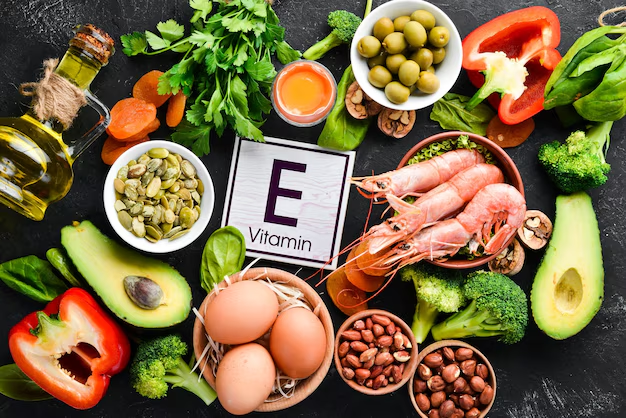
Vitamin E is a strong antioxidant that helps protect hair from damage caused by free radicals. These harmful particles can weaken hair strands and slow down growth. By fighting off this damage, Vitamin E supports healthy hair and is one of the important vitamins for hair growth.
This vitamin also helps improve blood circulation in the scalp. Better blood flow means more oxygen and nutrients reach the hair follicles, which can lead to stronger, shinier hair. It also helps keep the scalp moisturized, reducing dryness and flakiness that can affect hair health.
You can get Vitamin E from foods like nuts, seeds, spinach, and avocados. Many hair oils and shampoos also include Vitamin E for its nourishing benefits. Adding this nutrient to your diet or hair care routine can provide lasting results, making Vitamin E one of the essential vitamins for hair growth and strength.
Function: Fat-soluble antioxidant protecting cell membranes of scalp and follicles. Increases microcirculation when used topically and internally.
Sources: Almonds, sunflower seeds, spinach, avocados, olive oil.
Daily amount: ~15 mg α‑tocopherol. Most healthy diets exceed this.
Bonus: Eaten with vitamin C foods, vitamin E’s antioxidant effect is amplified.
Iron
Iron is a vital mineral that helps red blood cells carry oxygen to every part of the body, including the hair roots. Without enough oxygen, hair follicles can become weak, leading to thinning or hair loss. That’s why iron is often linked closely with vitamins for hair growth and overall hair strength.
Low iron levels, especially in women, are a common cause of hair shedding. This condition is known as iron deficiency anemia and can make hair grow slower or stop growing altogether. Ensuring your body gets enough iron is key for keeping hair healthy and strong.
Iron can be found in foods like red meat, spinach, lentils, and fortified cereals. Pairing iron-rich foods with sources of Vitamin C can improve absorption. Although iron is a mineral, it works hand in hand with other vitamins for hair growth, making it a crucial part of any hair care plan.
Importance: A component of hemoglobin—the oxygen transporter. Hair follicles need oxygen to thrive.
Deficiency signs: Often causes hair shedding, particularly in menstruating women and vegetarians/vegans.
Sources:
Heme iron (better absorbed): Red meat, poultry, fish.
Non-heme iron (plant sources): Lentils, chickpeas, spinach, amaranth, fortified cereals—but best taken with vitamin C for absorption.
Recommended intake:
Women 19–50 y: 18 mg/day
Vegetarians/vegans: up to 1.8× the RDA because of lower absorption.
Note: Too much iron can be harmful; test with a doctor before supplementing.
Zinc
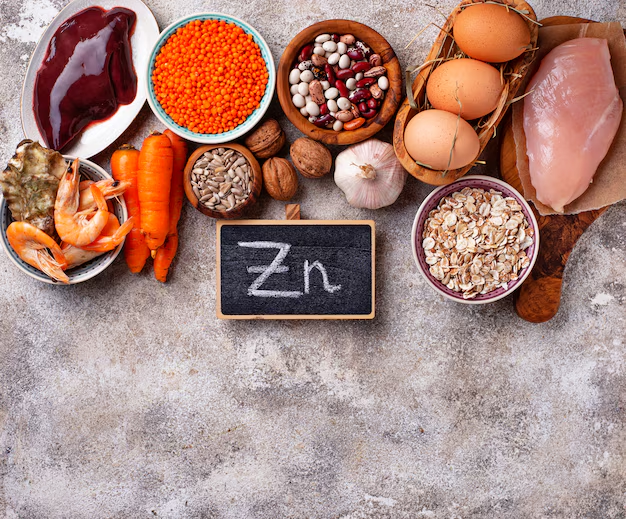
Zinc is a trace mineral that plays an important role in maintaining a healthy scalp and supporting hair tissue repair. It helps keep the oil glands around hair follicles working properly, which supports strong and steady hair growth. Because of this, zinc is often discussed alongside essential vitamins for hair growth.
A lack of zinc can lead to hair thinning, shedding, and even scalp issues like dandruff. Zinc helps with cell growth and repair, both of which are important for keeping hair roots healthy. It also supports the immune system, which indirectly helps protect hair from damage.
Zinc is found in foods like meat, shellfish, seeds, nuts, and dairy products. If your diet lacks these foods, a supplement may be helpful. While not a vitamin, zinc works with other nutrients to promote hair health, making it an important companion to vitamins for hair growth.
Purpose: Vital for protein synthesis, DNA repair, and maintaining oil-secreting glands on scalp.
Deficiency impact: Can cause hair loss and flaky scalp; supplementation often reverses these issues.
Sources: Pumpkin seeds, sesame seeds, chickpeas, yams, Greek yogurt, meats.
Intake:
Men: 11 mg/day
Women: 8 mg/day
Vegetarian/vegan needs are ~1.5× higher.
Caveat: Chronic high doses may interfere with copper absorption—so stick to food and balanced supplements unless advised otherwise.
Omega‑3 Fatty Acids
Omega-3 fatty acids are healthy fats that help nourish hair follicles and support scalp health. They reduce inflammation, which can improve the environment for hair to grow. Though not a vitamin themselves, they are often grouped with key nutrients and vitamins for hair growth due to their vital role in hair health.
These fatty acids help keep the scalp hydrated and can add shine and thickness to hair. They also support circulation, making sure that hair follicles get enough nutrients and oxygen. This helps prevent hair from becoming dry, brittle, or weak.
Omega-3s are found in fatty fish like salmon, as well as in walnuts, flaxseeds, and chia seeds. Supplements like fish oil capsules are also a popular choice. Including omega-3s in your diet helps balance and support other vitamins for hair growth, making them a key part of any hair care routine.
Function: Anti-inflammatory; support scalp health and shine. Provide essential building blocks healthy follicles crave.
Sources: Fatty fish (salmon, mackerel, sardines), chia seeds, flaxseed, walnuts, algae oil.
Typical recommendation: 250–500 mg EPA + DHA daily. Vegetarians/vegans benefit from algae-based DHA supplements.
Plus: Essential fatty acids enhance your body’s absorption of fat-soluble vitamins (A, D, E).
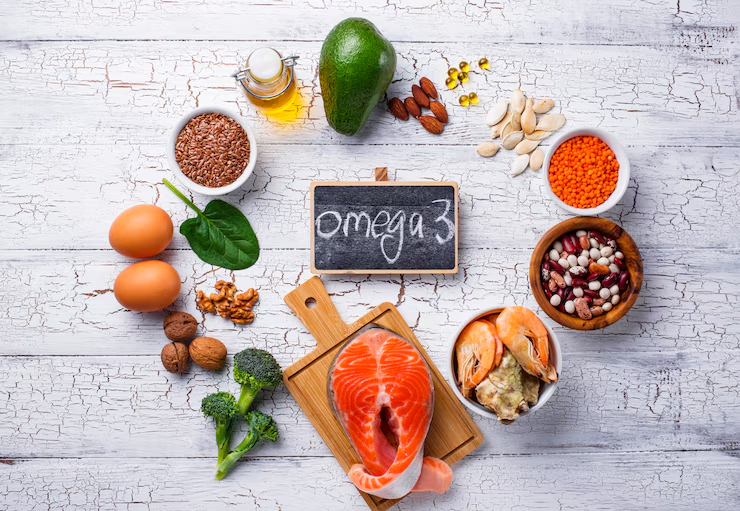
Silica, Copper & Trace Minerals
Silica, copper, and other trace minerals play an important role in keeping hair strong and healthy. Though needed in small amounts, they support the structure of hair strands and help maintain elasticity, preventing breakage. These minerals work together with vitamins for hair growth to support overall hair strength.
Copper helps with the production of melanin, which gives hair its natural color. It also supports blood flow to the scalp, which can encourage steady hair growth. Silica strengthens hair by boosting collagen production, making strands more flexible and less prone to damage.
Trace minerals like magnesium, selenium, and manganese also support healthy hair growth by protecting cells and boosting nutrient absorption. You can get these minerals from a balanced diet with whole grains, nuts, and leafy greens. Together with key vitamins for hair growth, these minerals play a valuable role in maintaining thick, shiny, and healthy hair.
Silica (Silicon): Strengthens hair and nails; abundant in horsetail tea, oats, barley, bananas, mangoes.
Copper: Involved in the formation of melanin—the pigment that gives hair its color; found in spinach, kidney beans, oats, cocoa.
Other trace elements: Selenium, iodine, and magnesium support thyroid function and cellular metabolism—all underlying components of healthy hair.
💡 Synergy & Bioavailability
Combine iron and vitamin C (spinach + bell pepper).
Pair fat-soluble vitamins (A, D, E) with healthy fats (avocado, olive oil).
Avoid excessive calcium with iron-rich meals—they can compete for absorption.
Whole-food sources often provide cofactors that enhance absorption and balance nutrients—for example, whole fruits come with fiber and bioflavonoids.
Regular blood tests ensure you’re not over- or under-supplementing, especially for D, B12, iron, and zinc.
📋 Sample Daily Meal Plan for Hair Growth
| Meal | Foods & Ingredients | Key Nutrients |
|---|---|---|
| Breakfast | Oats with chia seeds, flaxseed, walnuts, berries, banana, almond butter | Silica, omega-3, vitamin E, B vitamins |
| Mid‑day snack | Greek yogurt with pumpkin seeds and honey | Zinc, B12, probiotics |
| Lunch | Chickpea salad: spinach, bell pepper, carrots, quinoa, olive-oil dressing | Iron, vitamin C, A, healthy fats |
| Afternoon snack | Carrot sticks + hummus | Beta‑carotene, B vitamins, protein |
| Dinner | Grilled salmon/tofu, steamed broccoli, sweet potato, avocado salad | Vitamin D, omega-3, A, E, silica |
| Before bed | Calamansi tea (vitamin C) + horsetail extract | Silica, antioxidants |
🧬 Lifestyle: Beyond Vitamins
Even with perfect nutrition, other factors influence hair health:
Stress: Raises cortisol, which disrupts hair cycle.
Sleep: Melatonin and growth hormones at night support hair repair.
Scalp care: Weekly exfoliation and gentle shampoos prevent clogged follicles.
Hair handling: Avoid harsh treatments, heat, and rough brushing.
Sun exposure: Moderate sunlight for vitamin D—but protect hair from UV damage.
Conclusion

In conclusion, achieving healthy, vibrant hair requires more than just external care—it starts with nourishing your body from within. Essential vitamins for hair growth such as vitamin A, B-complex, C, D, E, along with minerals like iron and zinc, play a fundamental role in strengthening follicles, enhancing shine, and promoting new growth.
By including nutrient-dense foods like leafy greens, seeds, fatty fish, legumes, and colorful fruits into your daily diet, you provide your scalp and hair the building blocks they need to thrive.
Natural sources ensure better absorption, synergy, and long-term benefits without the risks of over-supplementation. While results may take time, consistency in nutrition and lifestyle can yield visibly healthier, fuller hair. Whether you’re recovering from hair loss or simply looking to improve thickness and texture, prioritizing vitamins for hair growth through a balanced, whole-food approach offers a sustainable and effective path to radiant, resilient hair.
FAQs
- What are the best vitamins for hair growth ?
The top vitamins include Biotin (B7), Vitamin D, Vitamin A, Vitamin E, and Vitamin C. Minerals like iron and zinc also play a crucial role in promoting healthy hair growth. - Can vitamin deficiencies cause hair loss ?
Yes. Deficiencies in key nutrients such as iron, vitamin D, biotin, or zinc can lead to thinning, shedding, and slow hair growth. A balanced diet helps prevent these issues. - How long does it take for vitamins to improve hair growth ?
Visible results typically appear within 2–3 months of consistent intake, though full benefits may take 6 months or longer depending on your body and any underlying deficiencies. - Is it better to get vitamins from food or supplements ?
Whole foods are ideal as they offer better absorption and a full range of nutrients. Supplements are useful when there’s a deficiency or dietary limitation. - Can taking too many vitamins damage hair ?
Yes. Overdosing, especially on vitamin A or zinc, may actually trigger hair loss. Always follow recommended dosages and consult a healthcare provider before supplementing.
